词汇学概念整理
英语词汇学知识点整理
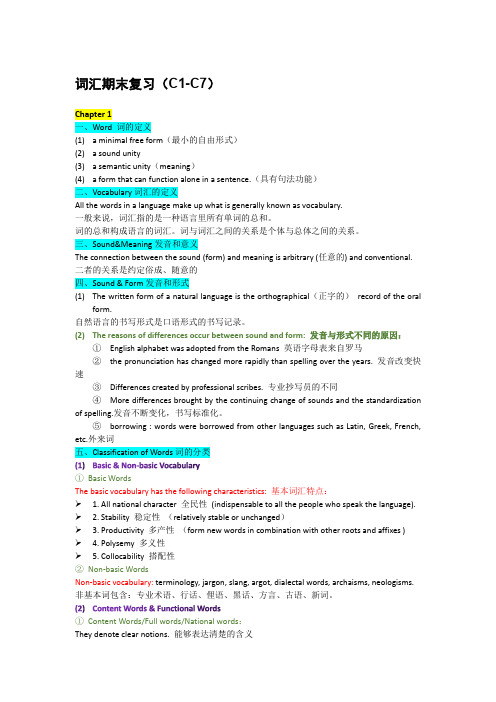
词汇期末复习(C1-C7)Chapter 1一、Word 词的定义(1) a minimal free form(最小的自由形式)(2) a sound unity(3) a semantic unity(meaning)(4) a form that can function alone in a sentence.(具有句法功能)二、Vocabulary词汇的定义All the words in a language make up what is generally known as vocabulary.一般来说,词汇指的是一种语言里所有单词的总和。
词的总和构成语言的词汇。
词与词汇之间的关系是个体与总体之间的关系。
三、Sound&Meaning发音和意义The connection between the sound (form) and meaning is arbitrary (任意的) and conventional. 二者的关系是约定俗成、随意的四、Sound & Form发音和形式(1)The written form of a natural language is the orthographical(正字的)record of the oralform.自然语言的书写形式是口语形式的书写记录。
(2)The reasons of differences occur between sound and form: 发音与形式不同的原因:①English alphabet was adopted from the Romans 英语字母表来自罗马②the pronunciation has changed more rapidly than spelling over the years. 发音改变快速③Differences created by professional scribes. 专业抄写员的不同④More differences brought by the continuing change of sounds and the standardization of spelling.发音不断变化,书写标准化。
英语词汇学中的名词解释
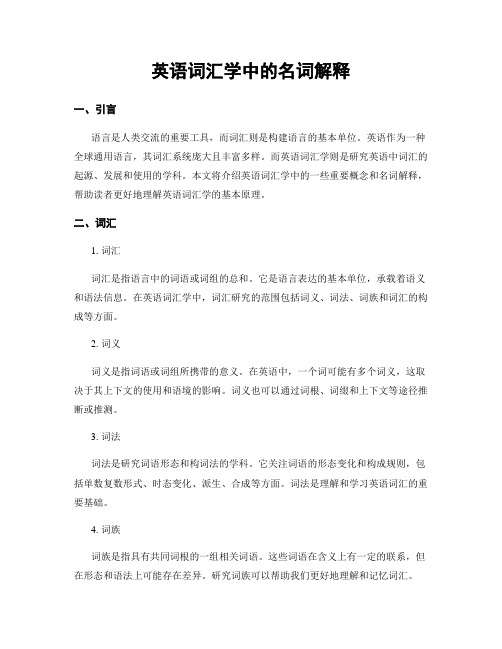
英语词汇学中的名词解释一、引言语言是人类交流的重要工具,而词汇则是构建语言的基本单位。
英语作为一种全球通用语言,其词汇系统庞大且丰富多样。
而英语词汇学则是研究英语中词汇的起源、发展和使用的学科。
本文将介绍英语词汇学中的一些重要概念和名词解释,帮助读者更好地理解英语词汇学的基本原理。
二、词汇1. 词汇词汇是指语言中的词语或词组的总和。
它是语言表达的基本单位,承载着语义和语法信息。
在英语词汇学中,词汇研究的范围包括词义、词法、词族和词汇的构成等方面。
2. 词义词义是指词语或词组所携带的意义。
在英语中,一个词可能有多个词义,这取决于其上下文的使用和语境的影响。
词义也可以通过词根、词缀和上下文等途径推断或推测。
3. 词法词法是研究词语形态和构词法的学科。
它关注词语的形态变化和构成规则,包括单数复数形式、时态变化、派生、合成等方面。
词法是理解和学习英语词汇的重要基础。
4. 词族词族是指具有共同词根的一组相关词语。
这些词语在含义上有一定的联系,但在形态和语法上可能存在差异。
研究词族可以帮助我们更好地理解和记忆词汇。
5. 词汇构成词汇构成是指由词根、词缀和其他语法成分组合而成的词语。
在英语中,许多词汇都是通过加上前缀、后缀或派生词缀来构建的。
研究词汇构成可以帮助我们学习和运用更多的词汇。
三、语义1. 语义语义是研究语言意义的学科。
它关注语言符号和所表示的意义之间的关系,包括词语、句子和篇章的意义。
在英语词汇学中,研究语义可以帮助我们理解和区分词语之间的差异。
2. 同义词同义词是指在特定语境下具有类似或相同意义的词语。
在英语中,同义词的选择可以丰富语言的表达,同时也对理解和翻译起到重要作用。
3. 反义词反义词是指在意义上相对对立或相互排斥的词语。
它们可以用来表达相反的概念或情感。
在英语中,反义词常常通过前缀、后缀或词根的变化来形成。
4. 上位词与下位词上位词是指泛指概念的词语,下位词则是指具体的概念。
例如,动物是"猫"的上位词,而"猫"是动物的下位词。
词汇学概念整理
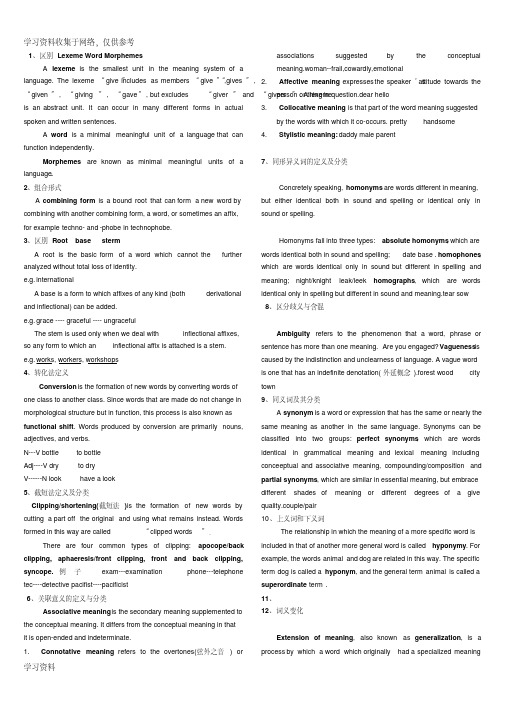
学习资料1、区别Lexeme Word MorphemesA lexeme is the smallest unit in the meaning system of a language. The lexeme “give ” includes as members “give ”, “gives ”, “given ”, “giving ”, “gave ”, but excludes“giver ” and “givers ”. A lexeme is an abstract unit. It can occur in many different forms in actual spoken and written sentences.A word is a minimal meaningful unit of a language that can function independently.Morphemes are known as minimal meaningful units of a language .2、组合形式A combining form is a bound root that can form a new word by combining with another combining form, a word, or sometimes an affix, for example techno- and -phobe in technophobe. 3、区别Root basestermA root is the basic form of a word which cannot the furtheranalyzed without total loss of identity. e.g. internationalA base is a form to which affixes of any kind (both derivationaland inflectional) can be added. e.g. grace ---- graceful ---- ungracefulThe stem is used only when we deal with inflectional affixes, so any form to which aninflectional affix is attached is a stem.e.g. works, workers, workshops 4、转化法定义Conversion is the formation of new words by converting words of one class to another class. Since words that are made do not change in morphological structure but in function, this process is also known as functional shift . Words produced by conversion are primarily nouns, adjectives, and verbs. N---V bottle to bottle Adj----V dry to dry V------N lookhave a look5、截短法定义及分类Clipping/shortening(截短法)is the formation of new words by cutting a part off the original and using what remains instead. Words formed in this way are called“clipped words”.There are four common types of clipping: apocope/back clipping, aphaeresis/front clipping, front and back clipping, syncope.例子exam---examinationphone---telephonetec----detective pacifist----pacificist 6、关联意义的定义与分类Associative meaning is the secondary meaning supplemented to the conceptual meaning. It differs from the conceptual meaning in that it is open-ended and indeterminate. 1.Connotative meaning refers to the overtones(弦外之音) orassociationssuggestedbytheconceptualmeaning.woman--frail,cowardly,emotional2.Affective meaning expresses the speaker ’s attitude towards theperson or thing in question.dear hello3.Collocative meaning is that part of the word meaning suggested by the words with which it co-occurs. pretty handsome4.Stylistic meaning: daddy male parent7、同形异义词的定义及分类Concretely speaking, homonyms are words different in meaning, but either identical both in sound and spelling or identical only in sound or spelling.Homonyms fall into three types: absolute homonyms , which are words identical both in sound and spelling;date base . homophones ,which are words identical only in sound but different in spelling and meaning; night/knight leak/leek homographs , which are wordsidentical only in spelling but different in sound and meaning.tear sow 8、区分歧义与含混Ambiguity refers to the phenomenon that a word, phrase or sentence has more than one meaning. Are you engaged?Vagueness is caused by the indistinction and unclearness of language. A vague word is one that has an indefinite denotation(外延概念).forest wood citytown9、同义词及其分类A synonym is a word or expression that has the same or nearly the same meaning as another in the same language. Synonyms can be classified into two groups: perfect synonyms , which are words identical in grammatical meaning and lexical meaning including conceeptual and associative meaning, compounding/composition and partial synonyms , which are similar in essential meaning, but embrace different shades of meaning or different degrees of a give quality.couple/pair 10、上义词和下义词The relationship in which the meaning of a more specific word is included in that of another more general word is called hyponymy . For example, the words animal and dog are related in this way. The specific term dog is called a hyponym , and the general term animal is called a superordinate term .11、12、词义变化Extension of meaning , also known as generalization , is a process by which a word which originally had a specialized meaninghas now become generalized or has extended to cover a broader and often less definite concept.Narrowing of meaning, also called specialization, is a process by which a word of wide meaning acquires a narrower or specialized sense.Elevation or amelioration refers to the process by which words rise from humble beginnings to positions of importance.Degadation or pejoration of meaning is a process by which words of good origin or affective neutrality fall into ill reputation or come to be used in a derogatory sense.12、为什么英语谚语具有结构固定性Characteristics of idioms: 1) Semantic unity : Each idiom is a semantic unity. The meaning of an idiom is very often not the total sum of the meanings of the constituent parts. In other words, an idiom functions as a unit of meaning which cannot be predicted from the literal meaning of its member words. 2) Structural stability: Structural stability means that the structure of an idiom usually remains unchangeable. In other words, the constituent components of an idiom can not, generally speaking, be replaced.13、Word formationDerivation:man superman. compounding:greeenhand conversion:nurse-to nurse. Abbreviation. back formation: to beg-beggar. o nomatopoeia:bark14、15、词的理据Motivation refers to the connection between the linguistic symbol (the word form) and its meaning. The relationship between the word-form and meaning is conventional and arbitrary, most words can be said to be non-motivated. These words are known as opaque words. Nevertheless, English does have words the meanings of which are transparent and reasonably explicable. These words are known as transparent words. Motivation can occur in four ways:phonetic motivation, morphological motivation, semantic motivation, etymological motivation.学习资料。
语言学词汇学与语义学的基本概念

语言学词汇学与语义学的基本概念语言是人类沟通交流的重要工具,而语言学作为对语言现象的系统研究,涉及到多个学科领域,其中包括词汇学与语义学。
本文将介绍语言学中的词汇学与语义学的基本概念。
一、词汇学的基本概念1. 词汇词汇是指某一语言中的词语的总称。
它包括单词和词组两个部分。
单词是构成句子的最小单位,它由一个或多个音节组成,表达一个具体的概念或意义;而词组是由两个或更多单词组合而成的短语,它们在语义上具有独立的意义。
2. 词汇分类根据词汇的不同特点,可以将其分类为实词和虚词。
实词是能够独立构成句子的词汇,包括名词、动词、形容词和副词等;而虚词则是不能单独构成句子,只能与实词一起使用,如冠词、代词、介词和连词等。
3. 词汇关系在词汇学中,词汇之间存在着多种关系。
同义词是指意义相同或相近的词语,如"快乐"和"愉快";反义词是指意义相反的词语,如"大"和"小";上位词是指包含更抽象概念的词,如"动物"和"狗"的关系;下位词则是指包含更具体概念的词,如"狗"和"汪星人"的关系。
二、语义学的基本概念1. 语义语义是指词语或句子所包含的意义。
它通过语言符号与现实世界之间的关联来实现。
语义研究的重点是词义和句义。
2. 词义词义是指一个词所表达的基本意义。
它可以通过定义、释义或者示例来描述。
词义的形成主要受到语境的影响,同一个词在不同的语境中可能有着不同的意义。
3. 句义句义是指一个句子所表达的意义。
句义由句子中词语的语法关系、语义关系以及上下文的语境所决定。
一个句子的句义不仅仅是简单词义的组合,还包括更深层次的逻辑和推理。
三、词汇学与语义学的关系词汇学研究的是词汇的形态、分类和关系等问题,而语义学则关注词汇的意义以及句子和篇章的意义构建。
两者之间密切相关,相互交叉影响。
词汇学知识点

词汇学知识点词汇学是语言学的一个重要分支,研究词汇的形态、构词法、含义、语法功能和使用规律等方面的知识。
词汇学知识点有助于我们更深入地了解语言的结构和规律,提高我们的语言运用能力和沟通能力。
下面将就词汇学的一些重要知识点进行详细介绍。
1. 词汇的分类根据词性的不同,词汇可以分为名词、动词、形容词、副词、代词、介词、连词和感叹词等不同种类。
名词是表示人、事、物、地点或抽象概念的词,如“学校”、“朋友”;动词是表示动作或状态的词,如“看”、“跑”;形容词是用来描述名词或代词的性质或特征的词,如“美丽”、“聪明”;副词是用来修饰动词、形容词或其他副词的词,如“很”、“非常”。
2. 词汇的构词法构词法是指词汇的构成规律和方法。
词汇可以通过加前缀、后缀、派生、复合、缩略、转化等方式形成新词。
比如,“美”+“丽”=“美丽”;“快”+“速”=“快速”;“快速”+“度”=“快速度”。
3. 词汇的含义词汇的含义是指词汇所代表的概念或事物。
词汇的含义可以根据词义的延伸、转义、比喻、象征等方式进行词义推论。
比如,“明星”原指天空中的星星,后引申为受人尊敬或崇拜的人。
4. 词汇的语法功能词汇在句子中具有不同的语法功能,如名词可以作主语、宾语、定语、表语等;动词可以表示主谓关系、宾语关系、状语关系等;形容词和副词可以修饰名词或代词等。
5. 词汇的使用规律词汇在语言运用中有一定的使用规律,比如词的搭配、语法环境、语言风格等。
正确地运用词汇有助于提高语言表达的准确性和丰富性。
通过以上对词汇学知识点的介绍,我们可以更系统地了解词汇在语言中的作用和重要性,进一步提高我们的语言水平和表达能力。
希望大家都能在学习词汇学知识点的过程中取得更好的成绩,展现自己在语言运用方面的能力。
【正文结束】。
词汇学知识点总结
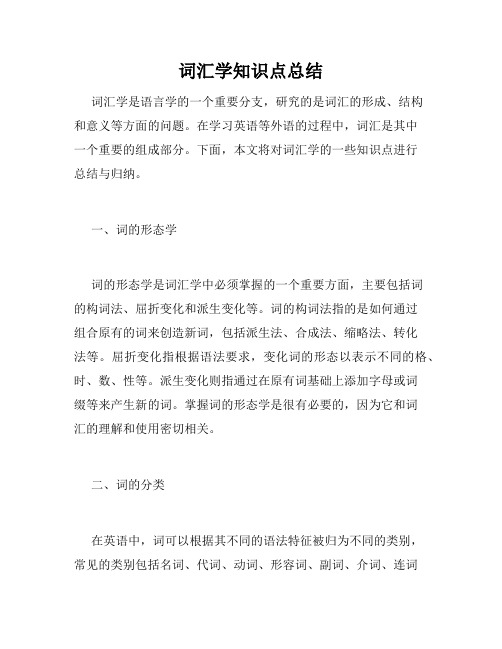
词汇学知识点总结词汇学是语言学的一个重要分支,研究的是词汇的形成、结构和意义等方面的问题。
在学习英语等外语的过程中,词汇是其中一个重要的组成部分。
下面,本文将对词汇学的一些知识点进行总结与归纳。
一、词的形态学词的形态学是词汇学中必须掌握的一个重要方面,主要包括词的构词法、屈折变化和派生变化等。
词的构词法指的是如何通过组合原有的词来创造新词,包括派生法、合成法、缩略法、转化法等。
屈折变化指根据语法要求,变化词的形态以表示不同的格、时、数、性等。
派生变化则指通过在原有词基础上添加字母或词缀等来产生新的词。
掌握词的形态学是很有必要的,因为它和词汇的理解和使用密切相关。
二、词的分类在英语中,词可以根据其不同的语法特征被归为不同的类别,常见的类别包括名词、代词、动词、形容词、副词、介词、连词和感叹词等。
不同的词在句子中扮演着不同的角色,掌握各类别之间的区别以及它们在句子中的作用,可以帮助我们更好地理解和表达语言。
三、词义词义是从语言学的角度定义词的意义,包括原义和引申义。
原义指的是一个词最基本的意思,而引申义则是在原义基础上经过延伸、扩展而得到的新意义。
同一个词的不同意义和语言环境等也会导致其含义的变化,例如“bank”既可以表示银行,也可以表示河岸等。
在学习外语的过程中,掌握词义是十分重要的。
四、词汇的学习方法词汇的学习是英语学习中最基础也最重要的部分之一,因此选择适合自己的学习方法对于提高词汇量、扩大词汇面积至关重要。
常用的学习方法包括反复背诵、积累单词簿、整理词根词缀、阅读和听力等。
在学习方法上,以选择适合自己和有用的方法为主,同时注意与语言运用的联系,不断地推广和实践。
五、词汇的应用掌握了词汇学的知识和学习方法后,其实就迈出了学习英语的第一步。
在实际运用中,如何运用得当也是至关重要的环节。
为了提高语言的流利度,需要在口语和书面语两个方面加强实践,增强实际运用能力。
另外,可以较晚多在社交网络等平台上与外国人联系,使用所学的词汇,将知识应用到实际交流之中,效果更佳。
英语词汇学知识点整理

词汇期末复习(C1-C7)Chapter 1一、Word 词的定义(1) a minimal free form(最小的自由形式)(2) a sound unity(3) a semantic unity(meaning)(4) a form that can function alone in a sentence.(具有句法功能)二、Vocabulary词汇的定义All the words in a language make up what is generally known as vocabulary.一般来说,词汇指的是一种语言里所有单词的总和。
词的总和构成语言的词汇。
词与词汇之间的关系是个体与总体之间的关系。
三、Sound&Meaning发音和意义The connection between the sound (form) and meaning is arbitrary (任意的) and conventional. 二者的关系是约定俗成、随意的四、Sound & Form发音和形式(1)The written form of a natural language is the orthographical(正字的)record of the oralform.自然语言的书写形式是口语形式的书写记录。
(2)The reasons of differences occur between sound and form: 发音与形式不同的原因:①English alphabet was adopted from the Romans 英语字母表来自罗马②the pronunciation has changed more rapidly than spelling over the years. 发音改变快速③Differences created by professional scribes. 专业抄写员的不同④More differences brought by the continuing change of sounds and the standardization of spelling.发音不断变化,书写标准化。
词汇学知识点总结

词汇学知识点总结词汇学是研究词汇的学科,它是语言学的一个重要分支,涉及了语言的构成、变化和使用等方面。
词汇学对于语言的理解和应用具有重要的意义,它不仅可以帮助我们更好地掌握语言知识,还可以帮助我们提高语言运用能力。
在这篇文章中,我们将对词汇学的知识点进行总结,帮助读者更好地理解和掌握这一学科。
一、词的定义和分类词是语言中的最小意义单位,是构成句子和表达意思的基本单位。
按照在句子中的功能和语法特征,词可以分为实词和虚词两大类。
实词包括名词、动词、形容词、副词等,它们能够表示具体的事物或抽象的概念;虚词包括代词、连词、介词、助词等,它们通常用来连接或修饰实词,没有明确的词义。
二、词汇的构成词汇的构成是指词的组成方式和形态特征。
在词汇的构成中,我们可以看到一些常见的构词法,如前缀、后缀、派生、合成、转化等。
通过这些构词法,我们可以对词汇进行灵活组合和创造,丰富语言的表达能力。
1.前缀前缀是指加在词根前面的一个字,可以改变词的词义或语法特征。
比如,“un-”表示否定,“re-”表示再次,“pre-”表示在前面等。
2.后缀后缀是指加在词根后面的一个字,同样可以改变词的词义或语法特征。
比如,“-ing”表示进行时,“-ful”表示充满的意思,“-ment”表示名词化等。
3.派生派生是指通过词根和词缀的组合来创造和衍生新的词。
比如,“happy”是一个形容词,通过加上“-ness”后缀就可以派生出名词“happiness”。
4.合成合成是指两个或多个词汇组合在一起,形成一个新的词。
比如,“blackboard”由“black”和“board”两个实词组合而成。
5.转化转化是指一个词汇的词类发生改变,但词形不变。
比如,“work”可以作为动词,也可以作为名词,它的词形都不发生变化。
词汇的构成方式是多种多样的,通过学习这些构词法,我们可以更好地理解和掌握词汇的形态特征,有助于提高我们的语言表达能力。
三、词汇的语义特征语义是指词汇所携带的意义,它是语言交流和理解的基础。
英语词汇学知识点归纳
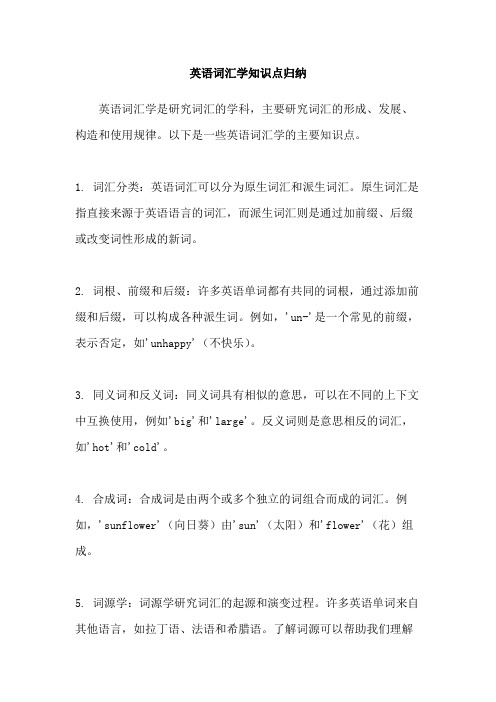
英语词汇学知识点归纳英语词汇学是研究词汇的学科,主要研究词汇的形成、发展、构造和使用规律。
以下是一些英语词汇学的主要知识点。
1. 词汇分类:英语词汇可以分为原生词汇和派生词汇。
原生词汇是指直接来源于英语语言的词汇,而派生词汇则是通过加前缀、后缀或改变词性形成的新词。
2. 词根、前缀和后缀:许多英语单词都有共同的词根,通过添加前缀和后缀,可以构成各种派生词。
例如,'un-'是一个常见的前缀,表示否定,如'unhappy'(不快乐)。
3. 同义词和反义词:同义词具有相似的意思,可以在不同的上下文中互换使用,例如'big'和'large'。
反义词则是意思相反的词汇,如'hot'和'cold'。
4. 合成词:合成词是由两个或多个独立的词组合而成的词汇。
例如,'sunflower'(向日葵)由'sun'(太阳)和'flower'(花)组成。
5. 词源学:词源学研究词汇的起源和演变过程。
许多英语单词来自其他语言,如拉丁语、法语和希腊语。
了解词源可以帮助我们理解词汇的含义和用法。
6. 词义的变化:词汇的意义会随时间和语境的变化而变化。
一些词汇可能会产生新的意义或失去原有的意义。
例如,'mouse'(老鼠)最初是指一种小动物,现在也可以指计算机的输入设备。
7. 词汇的语法功能:词汇在句子中扮演不同的语法角色,如名词、动词、形容词等。
了解词汇的语法功能可以帮助我们正确使用它们。
8. 语义关系:词汇之间存在各种语义关系,如同义关系、反义关系、上下位关系等。
了解这些关系可以帮助我们扩展词汇量,提高语言表达能力。
9. 词汇的习得和记忆:习得和记忆词汇是学习英语的重要一部分。
采用合适的记忆方法,如使用词汇卡片、词汇表等,可以帮助我们更好地掌握词汇。
以上是英语词汇学的一些主要知识点。
词汇学名词解释
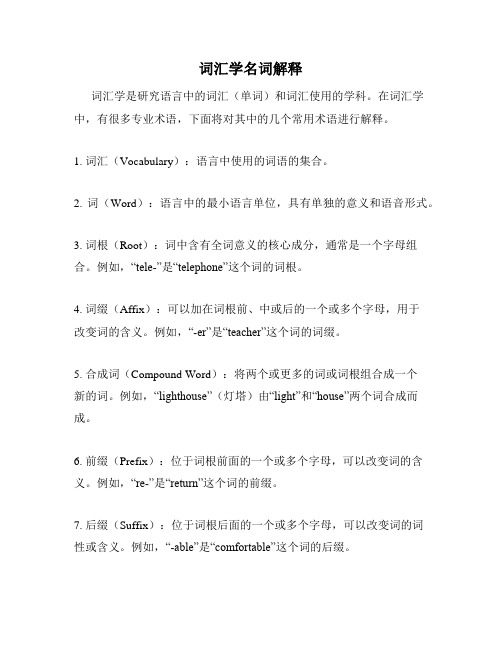
词汇学名词解释词汇学是研究语言中的词汇(单词)和词汇使用的学科。
在词汇学中,有很多专业术语,下面将对其中的几个常用术语进行解释。
1. 词汇(Vocabulary):语言中使用的词语的集合。
2. 词(Word):语言中的最小语言单位,具有单独的意义和语音形式。
3. 词根(Root):词中含有全词意义的核心成分,通常是一个字母组合。
例如,“tele-”是“telephone”这个词的词根。
4. 词缀(Affix):可以加在词根前、中或后的一个或多个字母,用于改变词的含义。
例如,“-er”是“teacher”这个词的词缀。
5. 合成词(Compound Word):将两个或更多的词或词根组合成一个新的词。
例如,“lighthouse”(灯塔)由“light”和“house”两个词合成而成。
6. 前缀(Prefix):位于词根前面的一个或多个字母,可以改变词的含义。
例如,“re-”是“return”这个词的前缀。
7. 后缀(Suffix):位于词根后面的一个或多个字母,可以改变词的词性或含义。
例如,“-able”是“comfortable”这个词的后缀。
8. 短语(Phrase):由两个或多个单词组成的词组,没有主语和谓语。
例如,“in the morning”(在早晨)是一个短语。
9. 句子(Sentence):有明确的主语和谓语,可以表达一个完整的意思。
以上是词汇学中常见的术语解释,它们有助于我们更好地理解语言中的单词和词组。
除此之外,词汇学还研究了词的来源、演变、分类和使用等方面,是一门十分重要的学科。
词汇学的基本知识
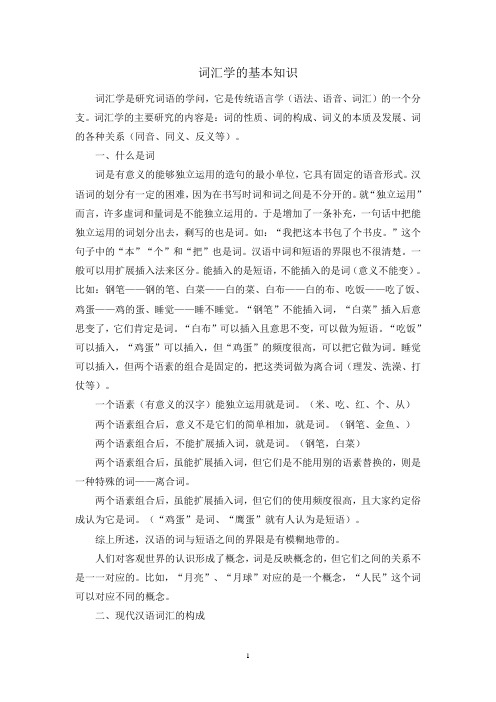
词汇学的基本知识词汇学是研究词语的学问,它是传统语言学(语法、语音、词汇)的一个分支。
词汇学的主要研究的内容是:词的性质、词的构成、词义的本质及发展、词的各种关系(同音、同义、反义等)。
一、什么是词词是有意义的能够独立运用的造句的最小单位,它具有固定的语音形式。
汉语词的划分有一定的困难,因为在书写时词和词之间是不分开的。
就“独立运用”而言,许多虚词和量词是不能独立运用的。
于是增加了一条补充,一句话中把能独立运用的词划分出去,剩写的也是词。
如:“我把这本书包了个书皮。
”这个句子中的“本”“个”和“把”也是词。
汉语中词和短语的界限也不很清楚。
一般可以用扩展插入法来区分。
能插入的是短语,不能插入的是词(意义不能变)。
比如:钢笔——钢的笔、白菜——白的菜、白布——白的布、吃饭——吃了饭、鸡蛋——鸡的蛋、睡觉——睡不睡觉。
“钢笔”不能插入词,“白菜”插入后意思变了,它们肯定是词。
“白布”可以插入且意思不变,可以做为短语。
“吃饭”可以插入,“鸡蛋”可以插入,但“鸡蛋”的频度很高,可以把它做为词。
睡觉可以插入,但两个语素的组合是固定的,把这类词做为离合词(理发、洗澡、打仗等)。
一个语素(有意义的汉字)能独立运用就是词。
(米、吃、红、个、从)两个语素组合后,意义不是它们的简单相加,就是词。
(钢笔、金鱼、)两个语素组合后,不能扩展插入词,就是词。
(钢笔,白菜)两个语素组合后,虽能扩展插入词,但它们是不能用别的语素替换的,则是一种特殊的词——离合词。
两个语素组合后,虽能扩展插入词,但它们的使用频度很高,且大家约定俗成认为它是词。
(“鸡蛋”是词、“鹰蛋”就有人认为是短语)。
综上所述,汉语的词与短语之间的界限是有模糊地带的。
人们对客观世界的认识形成了概念,词是反映概念的,但它们之间的关系不是一一对应的。
比如,“月亮”、“月球”对应的是一个概念,“人民”这个词可以对应不同的概念。
二、现代汉语词汇的构成词汇由词和固定的短语——熟语、谚语等构成。
《英语词汇学》知识点归纳
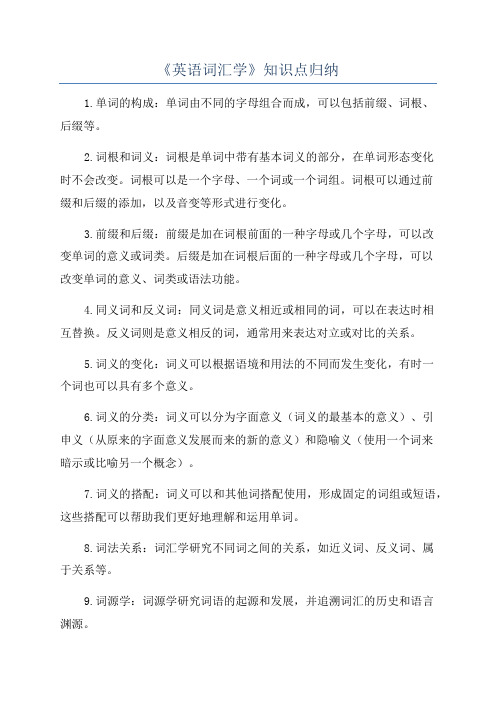
《英语词汇学》知识点归纳
1.单词的构成:单词由不同的字母组合而成,可以包括前缀、词根、
后缀等。
2.词根和词义:词根是单词中带有基本词义的部分,在单词形态变化
时不会改变。
词根可以是一个字母、一个词或一个词组。
词根可以通过前
缀和后缀的添加,以及音变等形式进行变化。
3.前缀和后缀:前缀是加在词根前面的一种字母或几个字母,可以改
变单词的意义或词类。
后缀是加在词根后面的一种字母或几个字母,可以
改变单词的意义、词类或语法功能。
4.同义词和反义词:同义词是意义相近或相同的词,可以在表达时相
互替换。
反义词则是意义相反的词,通常用来表达对立或对比的关系。
5.词义的变化:词义可以根据语境和用法的不同而发生变化,有时一
个词也可以具有多个意义。
6.词义的分类:词义可以分为字面意义(词义的最基本的意义)、引
申义(从原来的字面意义发展而来的新的意义)和隐喻义(使用一个词来
暗示或比喻另一个概念)。
7.词义的搭配:词义可以和其他词搭配使用,形成固定的词组或短语,这些搭配可以帮助我们更好地理解和运用单词。
8.词法关系:词汇学研究不同词之间的关系,如近义词、反义词、属
于关系等。
9.词源学:词源学研究词语的起源和发展,并追溯词汇的历史和语言
渊源。
10.词汇扩充:词汇学研究如何通过学习和运用词汇扩充词汇量,如学习词根、前缀和后缀的意义和用法,以及拆解和分析复杂单词的方法。
语言学知识点
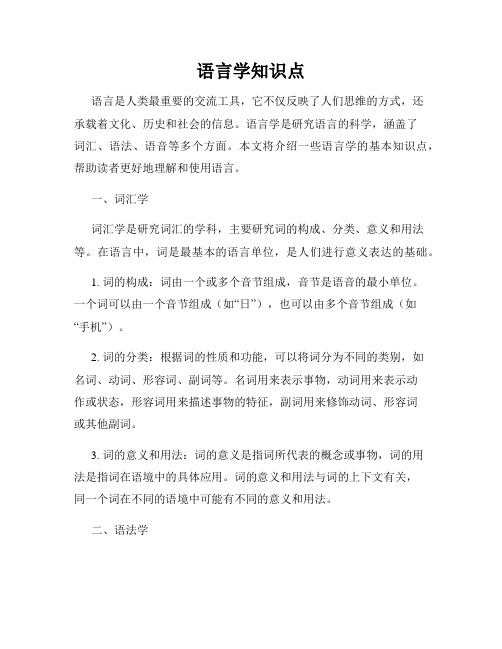
语言学知识点语言是人类最重要的交流工具,它不仅反映了人们思维的方式,还承载着文化、历史和社会的信息。
语言学是研究语言的科学,涵盖了词汇、语法、语音等多个方面。
本文将介绍一些语言学的基本知识点,帮助读者更好地理解和使用语言。
一、词汇学词汇学是研究词汇的学科,主要研究词的构成、分类、意义和用法等。
在语言中,词是最基本的语言单位,是人们进行意义表达的基础。
1. 词的构成:词由一个或多个音节组成,音节是语音的最小单位。
一个词可以由一个音节组成(如“日”),也可以由多个音节组成(如“手机”)。
2. 词的分类:根据词的性质和功能,可以将词分为不同的类别,如名词、动词、形容词、副词等。
名词用来表示事物,动词用来表示动作或状态,形容词用来描述事物的特征,副词用来修饰动词、形容词或其他副词。
3. 词的意义和用法:词的意义是指词所代表的概念或事物,词的用法是指词在语境中的具体应用。
词的意义和用法与词的上下文有关,同一个词在不同的语境中可能有不同的意义和用法。
二、语法学语法学是研究句子结构和句子之间关系的学科,主要研究句子的组成、句子成分的功能和语序等。
语法规定了语言的结构和组织方式,是语言表达的重要规范。
1. 句子结构:句子由词组合而成,词之间有一定的组织结构。
按照语法规则,句子可以分为主谓结构、主系表结构、主谓宾结构等不同的句子结构。
2. 句子成分:句子由一个或多个句子成分组成,句子成分包括主语、谓语、宾语、定语、状语等。
主语通常是进行动作的执行者,谓语表示动作或状态,宾语是动作的承受者或影响对象,定语和状语用来修饰名词或动词。
3. 语序:语序是指词或词组在句子中的排列顺序。
不同的语言有不同的语序规则,汉语的基本语序为主谓宾,但也可以根据需要进行灵活调整。
三、语音学语音学是研究语音的学科,主要研究语音的产生、传播和感知等。
语音是语言中最基本的声音单位,也是语言交流的基础。
1. 音素:音素是语言中最小的语音单位,用来区分词和词之间的差异。
词汇学第二章知识点总结
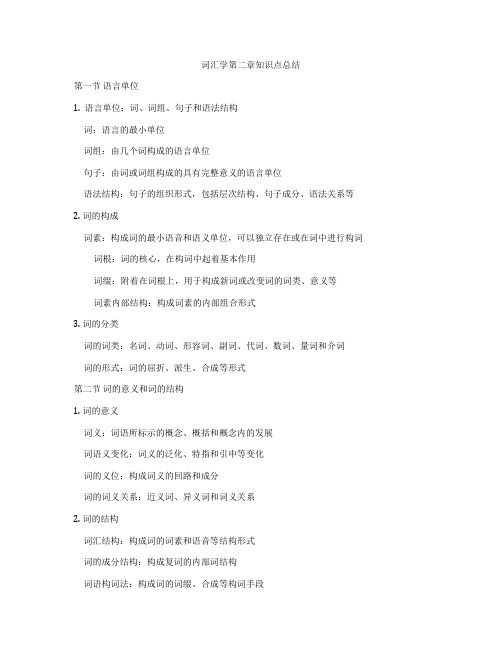
词汇学第二章知识点总结第一节语言单位1. 语言单位:词、词组、句子和语法结构词:语言的最小单位词组:由几个词构成的语言单位句子:由词或词组构成的具有完整意义的语言单位语法结构:句子的组织形式,包括层次结构、句子成分、语法关系等2. 词的构成词素:构成词的最小语音和语义单位,可以独立存在或在词中进行构词词根:词的核心,在构词中起着基本作用词缀:附着在词根上,用于构成新词或改变词的词类、意义等词素内部结构:构成词素的内部组合形式3. 词的分类词的词类:名词、动词、形容词、副词、代词、数词、量词和介词词的形式:词的屈折、派生、合成等形式第二节词的意义和词的结构1. 词的意义词义:词语所标示的概念、概括和概念内的发展词语义变化:词义的泛化、特指和引申等变化词的义位:构成词义的回路和成分词的词义关系:近义词、异义词和词义关系2. 词的结构词汇结构:构成词的词素和语音等结构形式词的成分结构:构成复词的内部词结构词语构词法:构成词的词缀、合成等构词手段第三节词义关系和词义演变1. 词义关系上下位关系:词义之间的概括和被概括关系同类词关系:在特定范畴或范围内词义之间的同类关系词语义联系:在使用中词义之间的联系和联系表达2. 词义演变词义的演变:在历史发展和使用中词义的变化和扩展词义变化类型:词义的泛化、转移、借代、内涵、外延等变化类型词义变化因素:历史、社会、文化、语言接触等诸多因素第四节词在句法中的功能和语意1. 词的句法功能词的句法功能:在句中词所承担的成分和功能句法结构:构成句子的各种句法成分的组织形式2. 词的语义特征词的语义特征:词的语义属性和特别意义词的意义转换:词义在句法中的隐喻、比喻、借代和辞让等转换方式词义在句法中的表现:词义在句中所呈现的语义特征和语义表达第五节词汇的心理基础1. 词汇的心理组织词的心理存储:词的存储方式和内部心理结构词汇记忆:词的认知和记忆方式及其规律词的心理连接:词之间在心理中的联结和联系2. 词汇的心理活动词的心理组织:词的认知、思维、理解、表达等心理活动词的心理过程:词的产生、使用、决策、回忆、判断等心理过程第六节词汇习得和使用1. 词汇的习得语言习得:语言学习者获取和掌握词汇的过程词汇习得理论:第一语言习得和第二语言习得的理论及其实践词汇习得策略:词汇习得过程中的学习策略和方法2. 词汇的使用词汇的应用范畴:词汇在语言和交际中的各种应用范畴和方式词汇的使用规律:词汇在使用中的频率、变化、地域差异等规律词汇的使用技巧:词汇使用中的技巧、技能、风格等第七节词汇学的理论和研究方法1. 词汇学的理论词汇研究理论:词汇研究的主流理论和方法词汇学派别:各种词汇学派别对词汇研究的探索和发展词汇发展趋势:未来词汇研究的方向、趋势、发展和应用2. 词汇学的研究方法词汇的研究方法:词汇的描述、分析、解释的研究方法和手段词汇的实证研究:词汇在使用中的实证研究方法和技术词汇的应用研究:词汇在语言学、教育学、心理学等领域的应用研究以上是词汇学第二章的知识点总结。
自考英语词汇学

自考英语词汇学一、基本概念。
1. Word(单词)- 发音:[wɜːd]- 词性:名词(n.)- 定义:A word is a single distinct meaningful element of speech or writing, used with others (or sometimes alone) to form a sentence and typically shown with a space on either side when written or printed.例如:“book”“run”“happy”都是单词。
2. Lexicon(词汇)- 发音:[ˈleksɪkən]- 词性:名词(n.)- 定义:The vocabulary of a person, language, or branch of knowledge. 一个人、一种语言或者一个知识领域的词汇总和。
例如:The lexicon of medical terms is very large.(医学术语的词汇量非常大。
)3. Morpheme(语素)- 发音:[ˈmɔːfiːm]- 词性:名词(n.)- 定义:The smallest meaningful unit in a language. 语言中最小的有意义的单位。
例如,“un - happy”中,“un -”(否定前缀,表“不”)和“happy”都是语素。
二、构词法(Word - formation)1. Prefixation(前缀法)- 发音:[priːfɪkˈseɪʃn]- 词性:名词(n.)- 定义:The formation of new words by adding prefixes to bases or stems. 通过给词根或词干添加前缀来构成新词。
- 例子:- “un -”(不) + “kind”(善良的) = “unkind”(不善良的),“un -”的发音:[ʌn]。
英语词汇学知识点归纳详细
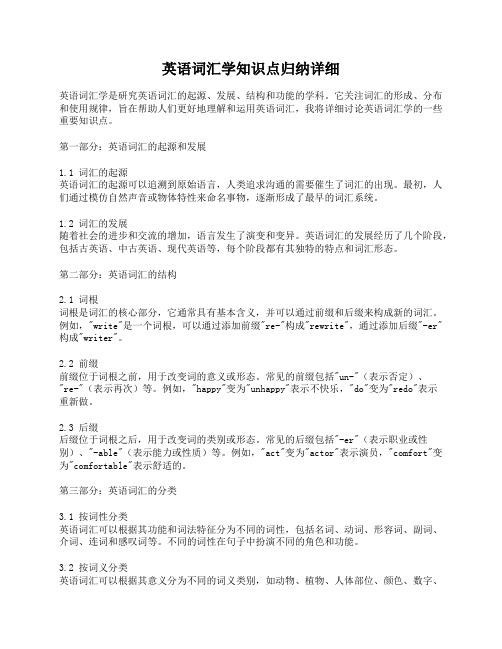
英语词汇学知识点归纳详细英语词汇学是研究英语词汇的起源、发展、结构和功能的学科。
它关注词汇的形成、分布和使用规律,旨在帮助人们更好地理解和运用英语词汇,我将详细讨论英语词汇学的一些重要知识点。
第一部分:英语词汇的起源和发展1.1 词汇的起源英语词汇的起源可以追溯到原始语言,人类追求沟通的需要催生了词汇的出现。
最初,人们通过模仿自然声音或物体特性来命名事物,逐渐形成了最早的词汇系统。
1.2 词汇的发展随着社会的进步和交流的增加,语言发生了演变和变异。
英语词汇的发展经历了几个阶段,包括古英语、中古英语、现代英语等,每个阶段都有其独特的特点和词汇形态。
第二部分:英语词汇的结构2.1 词根词根是词汇的核心部分,它通常具有基本含义,并可以通过前缀和后缀来构成新的词汇。
例如,"write"是一个词根,可以通过添加前缀"re-"构成"rewrite",通过添加后缀"-er"构成"writer"。
2.2 前缀前缀位于词根之前,用于改变词的意义或形态。
常见的前缀包括"un-"(表示否定)、"re-"(表示再次)等。
例如,"happy"变为"unhappy"表示不快乐,"do"变为"redo"表示重新做。
2.3 后缀后缀位于词根之后,用于改变词的类别或形态。
常见的后缀包括"-er"(表示职业或性别)、"-able"(表示能力或性质)等。
例如,"act"变为"actor"表示演员,"comfort"变为"comfortable"表示舒适的。
第三部分:英语词汇的分类3.1 按词性分类英语词汇可以根据其功能和词法特征分为不同的词性,包括名词、动词、形容词、副词、介词、连词和感叹词等。
语文词汇学知识点梳理
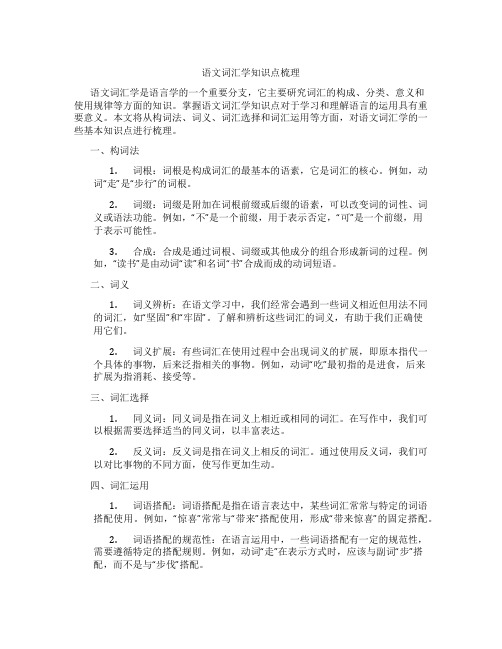
语文词汇学知识点梳理语文词汇学是语言学的一个重要分支,它主要研究词汇的构成、分类、意义和使用规律等方面的知识。
掌握语文词汇学知识点对于学习和理解语言的运用具有重要意义。
本文将从构词法、词义、词汇选择和词汇运用等方面,对语文词汇学的一些基本知识点进行梳理。
一、构词法1.词根:词根是构成词汇的最基本的语素,它是词汇的核心。
例如,动词“走”是“步行”的词根。
2.词缀:词缀是附加在词根前缀或后缀的语素,可以改变词的词性、词义或语法功能。
例如,“不”是一个前缀,用于表示否定,“可”是一个前缀,用于表示可能性。
3.合成:合成是通过词根、词缀或其他成分的组合形成新词的过程。
例如,“读书”是由动词“读”和名词“书”合成而成的动词短语。
二、词义1.词义辨析:在语文学习中,我们经常会遇到一些词义相近但用法不同的词汇,如“坚固”和“牢固”。
了解和辨析这些词汇的词义,有助于我们正确使用它们。
2.词义扩展:有些词汇在使用过程中会出现词义的扩展,即原本指代一个具体的事物,后来泛指相关的事物。
例如,动词“吃”最初指的是进食,后来扩展为指消耗、接受等。
三、词汇选择1.同义词:同义词是指在词义上相近或相同的词汇。
在写作中,我们可以根据需要选择适当的同义词,以丰富表达。
2.反义词:反义词是指在词义上相反的词汇。
通过使用反义词,我们可以对比事物的不同方面,使写作更加生动。
四、词汇运用1.词语搭配:词语搭配是指在语言表达中,某些词汇常常与特定的词语搭配使用。
例如,“惊喜”常常与“带来”搭配使用,形成“带来惊喜”的固定搭配。
2.词语搭配的规范性:在语言运用中,一些词语搭配有一定的规范性,需要遵循特定的搭配规则。
例如,动词“走”在表示方式时,应该与副词“步”搭配,而不是与“步伐”搭配。
以上是语文词汇学的一些基本知识点梳理。
通过掌握这些知识,我们可以更好地理解和运用词汇,提高语文水平。
同时,在学习过程中,我们也需要多加实践和运用,通过读书、写作等方式不断积累和扩展自己的词汇量,提高语言表达能力。
词汇学名词解释
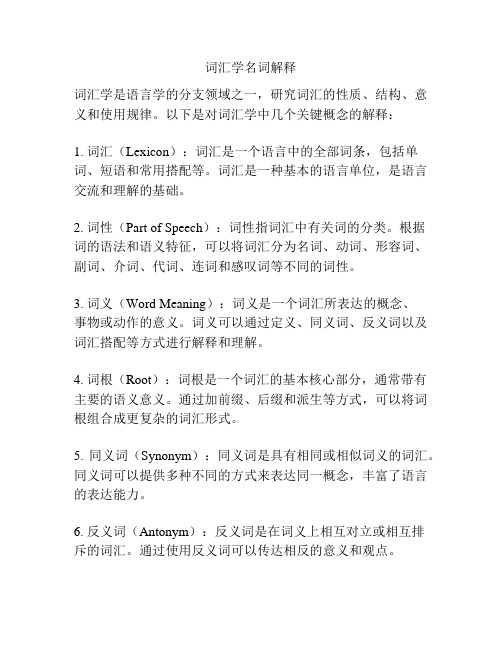
词汇学名词解释词汇学是语言学的分支领域之一,研究词汇的性质、结构、意义和使用规律。
以下是对词汇学中几个关键概念的解释:1. 词汇(Lexicon):词汇是一个语言中的全部词条,包括单词、短语和常用搭配等。
词汇是一种基本的语言单位,是语言交流和理解的基础。
2. 词性(Part of Speech):词性指词汇中有关词的分类。
根据词的语法和语义特征,可以将词汇分为名词、动词、形容词、副词、介词、代词、连词和感叹词等不同的词性。
3. 词义(Word Meaning):词义是一个词汇所表达的概念、事物或动作的意义。
词义可以通过定义、同义词、反义词以及词汇搭配等方式进行解释和理解。
4. 词根(Root):词根是一个词汇的基本核心部分,通常带有主要的语义意义。
通过加前缀、后缀和派生等方式,可以将词根组合成更复杂的词汇形式。
5. 同义词(Synonym):同义词是具有相同或相似词义的词汇。
同义词可以提供多种不同的方式来表达同一概念,丰富了语言的表达能力。
6. 反义词(Antonym):反义词是在词义上相互对立或相互排斥的词汇。
通过使用反义词可以传达相反的意义和观点。
7. 语义范畴(Semantic Field):语义范畴是一组具有相似语义关联的词汇。
这些词汇之间存在概念上的联系,并且可以通过它们之间的关系进行划分和归类。
8. 词汇搭配(Collocation):词汇搭配指的是在不同上下文中常常一起出现的词组合。
词汇搭配可以是习语、固定搭配或者常用的短语,对于正确地理解和使用词汇是非常重要的。
9. 词法关系(Lexical Relation):词法关系是不同词汇之间的关系,包括上下义关系、同源关系、形态关系、语法关系等。
这些关系有助于理解词汇之间的联系和共同特征。
10. 词源学(Etymology):词源学研究词汇的起源和历史发展。
通过对词汇的来源和历史变化的研究,可以了解词汇之间的发展和演变过程。
总之,词汇学的研究有助于我们更好地理解和使用词汇,掌握词汇的形式、意义和用法,从而提高语言的表达能力和沟通效果。
英语词汇学知识点概括总结

英语词汇学知识点概括总结
一、英语词汇学概述
英语词汇学是语言学的一个重要分支,研究的是词汇的形成、构成、分类和运用规律等。
对于学习英语的人来说,词汇是基础,因此了解英语词汇学知识点对于提高语言水平很有
帮助。
二、英语词汇的分类
英语词汇根据不同的分类标准可以分为不同的类型,按照词性分类,英语词汇可以分为名词、动词、形容词、副词、代词、介词、连词和感叹词等。
此外,英语词汇还可以按照构
词法、语义分类和语法功能等不同标准进行分类。
三、英语词汇的构成
英语词汇的构成主要包括词根、前缀、后缀和词干等部分。
通过不同的组合方式,可以构
成不同的词汇,使得英语词汇系统更加丰富多样。
四、词汇记忆与运用
词汇是语言运用的基础,因此词汇的记忆和运用是英语学习中的重要内容。
学习者可以通
过生词本、词根词缀、语境记忆等方式进行词汇的记忆,同时要注重词汇的运用,积累语感,灵活运用词汇。
五、词汇拓展与应用
在学习英语词汇的过程中,不仅要记忆掌握基础词汇,还需要不断拓展词汇量,了解词汇
在不同语境下的应用,丰富自己的词汇库,使得语言表达更加流畅。
六、英语词汇学研究的意义
英语词汇学的研究对于语言学的发展具有重要的意义,可以帮助我们了解语言规律,促进
语言教学和翻译工作的发展,同时还可以为语言教学提供理论基础和实践指导。
总之,英语词汇学是语言学的重要分支之一,研究词汇的构成、分类和应用等方面,对于
提高语言水平和推动语言学科的发展都具有重要意义。
因此,我们可以在学习中加强对英
语词汇学知识的学习,从不同角度掌握词汇的规律和应用,提高语言表达能力和运用能力。
- 1、下载文档前请自行甄别文档内容的完整性,平台不提供额外的编辑、内容补充、找答案等附加服务。
- 2、"仅部分预览"的文档,不可在线预览部分如存在完整性等问题,可反馈申请退款(可完整预览的文档不适用该条件!)。
- 3、如文档侵犯您的权益,请联系客服反馈,我们会尽快为您处理(人工客服工作时间:9:00-18:30)。
1、区别Lexeme Word MorphemesA lexeme is the smallest unit in the meaning system of a language. The lexeme “give” includes as members “give”, “gives”, “given”, “giving”, “gave”, but excludes “giver” and “givers”. A lexeme is an abstract unit. It can occur in many different forms in actual spoken and written sentences.A word is a minimal meaningful unit of a language that can function independently.Morphemes are known as minimal meaningful units of a language.2、组合形式A combining form is a bound root that can form a new word by combining with another combining form, a word, or sometimes an affix, for example techno- and -phobe in technophobe.3、区别Root base sterm⏹A root is the basic form of a word which cannot the further analyzed without total loss of identity.e.g. international⏹A base is a form to which affixes of any kind (both derivational and inflectional) can be added.e.g. grace ---- graceful ---- ungraceful⏹The stem is used only when we deal with inflectional affixes, so any form to which an inflectional affix is attached is a stem.e.g. works, workers, workshops4、转化法定义Conversion is the formation of new words by converting words of one class to another class. Since words that are made do not change in morphological structure but in function, this process is also known as functional shift. Words produced by conversion are primarily nouns, adjectives, and verbs.N---V bottle to bottleAdj----V dry to dryV------N look have a look5、截短法定义及分类Clipping/shortening(截短法)is the formation of new words by cutting a part off the original and using what remains instead. Words formed in this way are called “clipped words”.There are four common types of clipping: apocope/back clipping, aphaeresis/front clipping, front and back clipping, syncope.例子exam---examination phone---telephone tec----detective pacifist----pacificist6、关联意义的定义与分类Associative meaning is the secondary meaning supplemented to the conceptual meaning. It differs from the conceptual meaning in that it is open-ended and indeterminate.1.Connotative meaning refers to the overtones(弦外之音) orassociations suggested by the conceptual meaning.woman--frail,cowardly,emotional2.Affective meaning expresses the speaker’s attitude towards theperson or thing in question.dear hello3.Collocative meaning is that part of the word meaning suggestedby the words with which it co-occurs. pretty handsome4.Stylistic meaning: daddy male parent7、同形异义词的定义及分类⏹⏹Concretely speaking, homonyms are words different in meaning, but either identical both in sound and spelling or identical only in sound or spelling.⏹⏹Homonyms fall into three types: absolute homonyms, which are words identical both in sound and spelling; date base . homophones, which are words identical only in sound but different in spelling and meaning; night/knight leak/leek homographs, which are words identical only in spelling but different in sound and meaning.tear sow 8、区分歧义与含混Ambiguity refers to the phenomenon that a word, phrase or sentence has more than one meaning. Are you engaged?Vagueness is caused by the indistinction and unclearness of language. A vague word is one that has an indefinite denotation(外延概念).forest wood city town9、同义词及其分类A synonym is a word or expression that has the same or nearly the same meaning as another in the same language. Synonyms can be classified into two groups: perfect synonyms, which are words identical in grammatical meaning and lexical meaning including conceeptual and associative meaning, compounding/composition and partial synonyms, which are similar in essential meaning, but embrace different shades of meaning or different degrees of a give quality.couple/pair10、上义词和下义词The relationship in which the meaning of a more specific word is included in that of another more general word is called hyponymy. For example, the words animal and dog are related in this way. The specific term dog is called a hyponym, and the general term animal is called a superordinate term.11、12、词义变化Extension of meaning, also known as generalization, is a process by which a word which originally had a specialized meaning学习资料has now become generalized or has extended to cover a broader and often less definite concept.Narrowing of meaning, also called specialization, is a process by which a word of wide meaning acquires a narrower or specialized sense.Elevation or amelioration refers to the process by which words rise from humble beginnings to positions of importance.Degadation or pejoration of meaning is a process by which words of good origin or affective neutrality fall into ill reputation or come to be used in a derogatory sense.12、为什么英语谚语具有结构固定性Characteristics of idioms: 1) Semantic unity : Each idiom is a semantic unity. The meaning of an idiom is very often not the total sum of the meanings of the constituent parts. In other words, an idiom functions as a unit of meaning which cannot be predicted from the literal meaning of its member words. 2) Structural stability: Structural stability means that the structure of an idiom usually remains unchangeable. In other words, the constituent components of an idiom can not, generally speaking, be replaced.13、Word formationDerivation:man superman. compounding:greeenhand conversion:nurse-to nurse. Abbreviation. back formation: to beg-beggar. onomatopoeia:bark14、15、词的理据Motivation refers to the connection between the linguistic symbol (the word form) and its meaning. The relationship between the word-form and meaning is conventional and arbitrary, most words can be said to be non-motivated. These words are known as opaque words. Nevertheless, English does have words the meanings of which are transparent and reasonably explicable. These words are known as transparent words. Motivation can occur in four ways:phonetic motivation, morphological motivation, semantic motivation, etymological motivation.学习资料。
